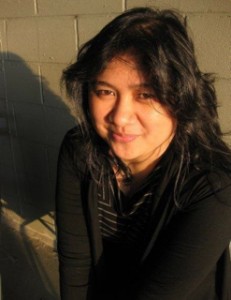September 18, 2012 Presentation to the Empire State Virtual Branch Teleconference
Amina Tawasil began her Ph.D. program at Teachers College, Columbia University in the fall of 2007. That Fall semester the President of Iran came to give a lecture at Columbia University and in that lecture he invited members of the audience to visit Iran to see if whether the media outlets outside Iran provide an accurate picture of Iranian society. Amina took him up on that offer.
Amina wanted to see what a promise of an attempt to build an Islamic state would look like in the lives of women who were part of the project of building, and women who were deemed loyal to that project. Amina drafted a research design for a pilot study, defended it to her doctoral cohort and professors, and eventually made her way to Tehran for two months in 2008. At that time, she wanted to see how far she could go in studying the lives of a handful of seminarian women — this specific group of women is difficult to access.
From that pilot-study, Amina established and developed connections within Iran, and was then allowed to return in 2010 to finish her ethnographic fieldwork requirement.
There has been little ethnographic field research conducted on the women’s seminaries in Iran, specifically using an anthropological approach. These are women who are situated in a clerical establishment as part of a post-revolution, post-Islamist state structure. Much of what we know about them comes from how the popular media has negatively portrayed the clerical establishment composed predominantly of men in Iran.
For 15 months, Amina lived in Tehran, Iran and spent time with women from two kinds of seminaries. She looked at their day to day activities which takes place outside the seminaries – how they make decisions, what or who facilitates their mobility, where they see themselves five years from that time and so on. This specific group of women taught her how they make and remake their paths to an education in that educative setting. That they are not passive members of the clerical establishment, and where some of them are 33 years after the 1979 revolution.
The title of Amina’s dissertation is “Houzeh (Seminarian) Women in Iran: Constituting and Reconstituting Paths”.
Applying for Her AAUW Fellowship
Amina first became aware of AAUW as a resident in Bancroft Hall at Teachers College. She came home one day to receive a voice message from AAUW for the previous tenant. She looked the organization up online and discovered what it offered women. Amina’s made her first contact with AAUW through the application process on the website.
The AAUW fellowship has been beneficial in terms of being able to fully dedicate herself to writing the dissertation. She has just completed her first draft, writing an average of 8 hours a day without the necessity of holding a job to make ends meet. The fellowship has also given her credibility among her professional network.
Amina intends to do a lot of networking within AAUW and join local chapters, wherever it may be. Amina also plans to offer her expertise, skills and what not at networking or mentorship events.
Planning the Future
Amina’s primary goal this year is to finish her dissertation and hopefully get job interviews, experience job talks, or gain postdoctoral placements by the fall of 2013. With her research, Amina has gained many valuable skills, like qualitative research methods and analysis, the Farsi language, and diplomacy. Thereafter, she hopes to do three things — university teaching, research, and consulting related to women’s and girls’ education in the Middle East and war zones.
Three years from now, Amina hopes to have secured a faculty seat at a liberal arts college or a women’s college in the United States continuing her work in teaching, research and mentoring young women. She plans to publish a book and journal articles from her research. Amina will need to secure funding for future research related to women’s and girls’ education.
Aside from writing her dissertation, Amina is continuously mentoring students she has had in the past. However, she feels this is not enough. Five years from now, Amina hopes to work for small groups within the U.N. to meet the Millennium Development Goals about girls’ education or she hopes to be able to start a non-profit organization somewhere in the Muslim world using participatory oral histories of women and girls as a transformative process towards realization of their locally and self-defined goals in life.
Amina has started the process slowly by getting her colleagues from Stanford and Columbia to commit a small portion of their time towards this endeavor. She believes this project will not only build bridges between girls and women of the east and west, but it will also become an avenue for girls and women to gain that self-motivation to push forward in their personal and career goals.
We look forward to following Amina’s career path and will encourage AAUW branches and Campus Partners to learn more about her.



